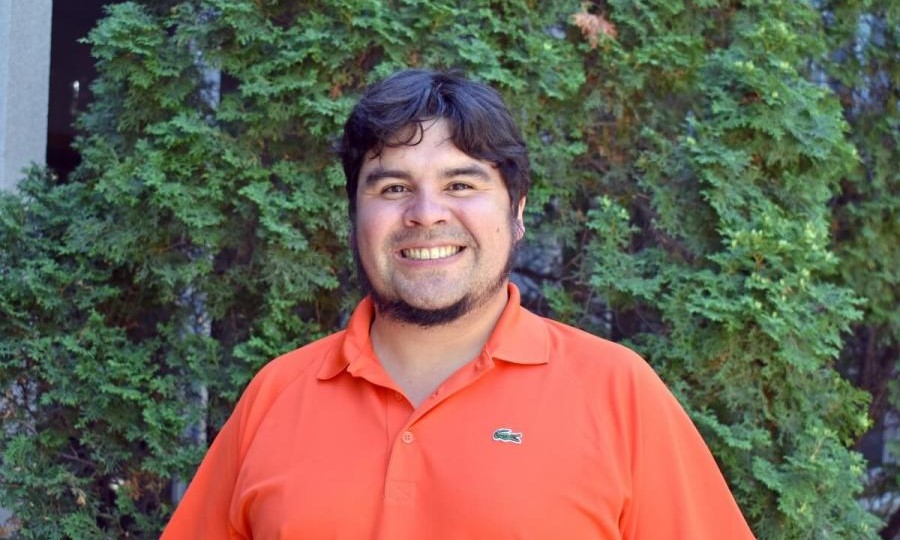
Dr. Kyle Bobiwash, 2023 recipient of the Terry G. Falconer Memorial Rh Institute Foundation Emerging Researcher Award in the Interdisciplinary category.
Meet Kyle Bobiwash, 2023 Rh Award Winner in the Interdisciplinary category
Kyle Bobiwash, an assistant professor and Indigenous Scholar in the Department of Entomology, focuses on pollination ecology and biodiversity, emphasizing the integration of Indigenous knowledge systems.
Bobiwash is the 2023 recipient of the Terry G. Falconer Memorial Rh Institute Foundation Emerging Researcher Award in the Interdisciplinary category. His innovative research on pollinator health and sustainable agricultural practices, along with his dedication to bridging Indigenous and Western scientific methodologies, highlights his significant contributions to both academia and community engagement.
UM Today caught up with Bobiwash to learn more about him and the research he is undertaking.
Tell us a bit about yourself and your research.
I’m Kyle Bobiwash. I’m Anishinaabe from Mississauga First Nation on the north shore of Lake Huron. I have a dog and a research colleague, Professor Pickles. I’ve had fantastic mentors who enabled me to learn on the land and excel in the classroom.
From a young age, I always thought I could do science better than all these white folks out there, so I launched myself all in during grad school. At the University of Manitoba, I work with colleagues like Jason Gibbs and Rob Currie on pollination ecology and biology. We study pollination not just from a top-down perspective but by looking at landscapes, floral resources and the needs of flowers and organisms in these landscapes, from the perspective of research organisms.
We want to understand what drives community composition and well-being of pollinators and general biodiversity. My students do everything from basic biodiversity work all the way to really cool, new pathogen spillover studies to identify disease transmission pathways among pollinators.
Connecting to who I am as an Anishinaabe person, we also use models like Three Sisters farming to build science capacity and ask deeper questions, not only in Western science but in Indigenous knowledge systems.
Why is this research important?
I often think about this, and it really isn’t important for the vast majority of people. Of course, pollination and pollinator health are important to society. But what’s crucial is connecting our land management practices to clear, solid evidence.
It’s about improving habitats and outcomes for pollinators. We need to understand what that actually means. We know that more flowers probably mean happier bees, but the nuance is essential.
In Canada, and particularly in Manitoba, there’s a push and pull between economic interests and ecological interests. We need to think beyond traditional agricultural benefits and connect human actions and policies to biodiversity impacts. Ensuring our values align with environmental well-being is really important.
What does winning the Rh Award mean to you?
I was really interested by this opportunity and spent some time reading about the Falconer Award. It’s an honour, especially since it supports emerging research that engages the public.
This recognition connects me to others doing important science that benefits society. The award is encouraging and motivates me to keep working on innovative and impactful projects.
The financial support is also big, allowing for more flexibility in my research, like maybe hiring more graduate students or engaging community volunteers.
What do you hope to achieve in the future?
I split my time between the university and being a researcher in residence at the Office of the Chief Science Advisor of Canada. My goal is to ensure that my research benefits farmers and communities, driving self-determination and sustainable practices.
I want to connect detailed pollination biology to broader goals like science policy and sustainable agriculture. It’s about making sure that science benefits society and supports communities.
What about you might people find surprising?
People might find it surprising that I have racing pigeons in my backyard, enjoy bonsai work, love hunting and being out on the land and am dedicated to miniature wargaming.
Any advice for early career researchers and students?
For early career researchers, make sure that opportunities align with both professional and personal development. Don’t get bogged down by the perceived requirements for tenure and promotion or thesis requirements.
Focus on projects and partnerships that truly matter to you and help you grow. Collaborate with people from diverse fields and find a niche that values your contributions and has a good place for you.
Research at the University of Manitoba is partially supported by funding from the Government of Canada Research Support Fund.






